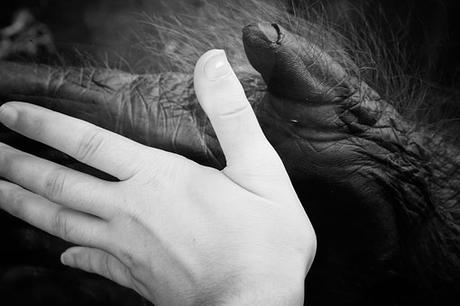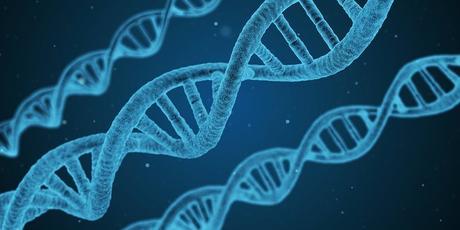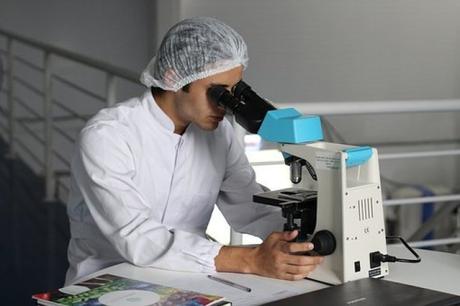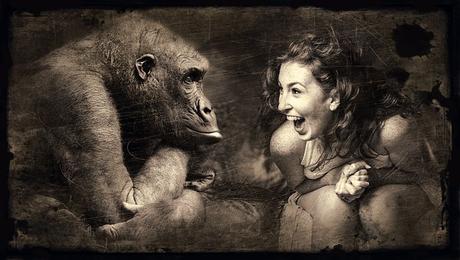
Genetics has always been a highly intriguing branch of biology, one that curious humans connect with the most. The study of genetics provides invaluable insight into why our body functions in the ways it does. If only we could decode the trillions of protein codes in just human DNA, we'd probably know everything there is about evolution on our planet.
Scientists all across the world have long been intrigued by the genetic composition of human beings. A recently developing interest in genetics is the comparison of human genetic composition with that of other living beings. Scientists of today get a certain kick out of discovering genetic similarities between humans and other living beings. And believe it or not, but according to these obsessed geneticists, we are 50% the same as bananas and 80% dogs. Now, it is universally known that humans are relatives of monkeys and apes, all having descended from the Great Apes. So if we are genetically so similar to things like a banana, how similar are we to these monkeys and chimps?
Humans are genetically 97% orangutan and 99% chimpanzee!

Yes, you read that right. According to the geneticists of our world, we are actually closer to our tree climbing relatives than we could've anticipated. And come to think about it, we are actually quite similar to chimpanzees. They are the only apes that can walk on their own two feet. Chimps are also pretty intelligent and know how to communicate with facial expressions. They are social animals, know how to make tools (like the early humans), and have commendable cognitive abilities.
And if you sit a chimp down and try to teach him the English alphabet or the numbers 0-9, you will be surprised at how fast they learn. The average intelligence of a chimpanzee is similar to that of a 2-3-year-old human toddler. If you have been to large scale circuses or watched reality TV shows like Pankun, you'll know what I'm talking about. But even so, doesn't 99% seem to be too big a number? Are we really that similar to a chimpanzee?
What are genes, and what exactly is genetics?

Genetics is not just one of the most intriguing, but also one of the most complex branches of biology. Hence it is no surprise that out of some 20 million doctors in the world, only around a hundred thousand are certified geneticists. Genetics is the study of genes, those proteins that contain information about our body. These genes are similar to a computer program, they collectively form the program code of our body aesthetics and functionality.
Genes are actually made of protein base-pair sequences. Each base pair is made of two protein molecules held together by a hydrogen bond. A definite sequence of these base pairs is called a gene, and many such sequences form a genome. This doesn't sound very intimidating when explained in this way, but each genome can contain more than 3 billion base pairs. Decoding so many base pairs and sequences is a tough task, to say the least.
Now, DNA is also of two types- coding and non-coding. The coding DNA is what takes part in protein synthesis, and every such DNA has a specific purpose in the body. On the other hand, non-coding DNA simply acts as a database for the body's composition. Some non-coding DNA als h o act as switches for turning on/off the functioning of certain coding DNA.
The above paragraph is of importance because 98% of the DNA present in the human body is of the non-coding type. Because of the active involvement of coding DNA in protein synthesis, it is relatively easier to decode them and study them. But the non-coding DNA is equivalent to a black box- you don't know what's going on in it.
Back to the question, are we really 99% chimp?
The answer is, no we are not. I mean, just think about it. If we were 99% chimp, then why aren't we munching on termites and bananas in African jungles alongside them? And if we were 99% chimp, this blog wouldn't exist. Buddymantra, the Internet, your laptop, and the DNA testing equipment that attested to us being 99% chimp wouldn't exist either.
Then what makes the geneticists say so?

The answer to this question is, a genome comparison experiment done in 2005. In this test, some protein sequences from both chimpanzees and humans were compared side by side. On comparing them, once the segments completely different from each other were removed, the similar segments were compared, to find that they were 99% similar. Also, this test was conducted on the protein-coding DNA of both humans and chimpanzees.
And as I said above, this protein coded DNA only makes up 2% of the total DNA present in our body. The other 98% was unaccounted for in this particular experiment. But once the results came out, the actual truth behind this experiment was completely disregarded by scientists and media alike. Over the years, new research experiments have taken place, but the sentence "Humans are 99% chimp" is just attractive. Also, the fact that chimpanzees are closely related to humans by virtue of having a common ancestor, scientists who claim this may be called biased.
A more recently done research in 2012 revealed that even in the genes present in both chimps and humans, there are some differences. Every living being has a set of genes called "transcription factors". These are the non-coding DNA that act as switches for protein-coding DNA. According to this research, only 2/3rd of the transcription factors corresponding to these similar genes found in humans are present in chimps. The other 1/3rd are exclusively found in humans. And because of this, those similar genes function very differently in chimps as compared to humans, or they don't function at all.
The final verdict?

We are NOT 99% chimp, or 97% orangutan, or 90% cat, 80% dog, or 50% banana. What we are, is 100% human, aka Homo sapien. Genetics is just like the English language. Every living being has the same proteins that make up their genes. It's just the way they are arranged in base pairs and genomes is what makes every living being unique.
If you were to pick up a Charles Dickens book and a Political History book, there would be quite a few sentences and phrases you may find are similar in both books. But that doesn't make Charles Dickens and Political History similar. The context, and in the case of genetics, the function of these genes is what matters. And although genetic comparison of living beings is a highly intriguing field of research, we shouldn't take it too seriously.
We should be proud of who we are, and what we can do. Humans are one of the most advanced creatures on this planet, with the best cognitive and analytical abilities, and the brightest brains. We may be similar to a lot of other living beings because everyone evolved from the same source. But that doesn't make us any less unique, and that is all that matters!

